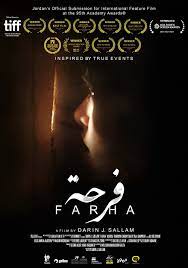
FARHA
Jordan, 2021, 93 minutes, Colour.
Karam Taher, Ashraf Barhom, Ali Suliman, Tala Gammoh.
Directed by Darin J. Sallam.
Nakba is an Arabic word meaning “catastrophe” and refers to Israel's ethnic cleansing of Palestine, its exiling of Palestinians and making them into refugees, its dispossession of Palestinian property, its destruction of Palestinian cities, towns, and villages, and its attempt to erase the existence of the Palestinian ...
Farha the name of a young girl in a Palestinian village, 1948. There are scenes of the British occupation withdrawing – and children throwing stones of the British soldiers. There are happy sequences in the village, especially meetings for marriage arrangements, preparations for marriage. However, Farha wants to study, to go to the city, her father, the mayor of the town, eventually agreeing.
But, it is 1948, the time of the catastrophe for Palestinians, the setting up of the state of Israel, the troops moving into the villages, attacking the local citizens, ousting them, some massacres (the theme of the Israeli film, the documentary about the issues and events in this film, Tantura). It can be noted that Israeli authorities wanted this film to be removed from Netflix and impose some bands on the screening of Tantura, even though it is an Israeli production.
The rest of the film is quite harrowing, her father having to go off with the invading Israelis but promising to return. To safeguard his daughter, he locks her in a store room where she spends several days, surviving, anxious, wanting her father. The film is quite powerful in this presentation of a girl surviving in this confined space.
But, before her father returns, a family arrive, the mother about to give birth, seeking refuge in the house, Farha observing through a hole in the wall, the shooting of the father, the mother giving birth and her child, the mother killed, the baby exposed and dying, the callousness of the Israeli commander, the misgivings of one of the soldiers but the killing of the child.
Eventually, her father returns, Farha getting out of the store room – but her life changed, her escaping to Syria, her witnessing to these events over the many decades.
- The title and focus? The young girl, Palestinian, hopes, sad experiences?
- 1948, the situation in Palestine, the retreat of the British (and the glimpse of the boys throwing stones at the jeeps and wishing them gone)? The Israelis? The state of Israel? The Nakba, the catastrophe from the Palestinian point of view?
- Israel wanting this film to be removed from Netflix? As well as Farha, this film is really a film about the Nakba?
- Audience interest in, sympathies for the Palestinians, for the state of Israel? The subsequent conflicts, the possibility of a one state?
- The setting, the village, the greenery, the children, at play, the homes, Farha and Farida, the differences between living in the village and the city, Farha and her hopes for education, in the city, her father’s reaction, her stepmother travelling away, the prospect of the suitor, the meetings with him in the family, Farha not wanting to marry him? And the background of the girl from the village and the preparations and celebrations for the marriage?
- The prospect of the Israeli invasion of the village, apprehensions, preparations? Explosions and the coming forces?
- The father, Mayor of the town, his devotion to his daughter, his agreeing that she should go to the city for studies, the documents? Her being overjoyed?
- The coming of the Israelis, the dangers, for reader and her father going to the city, her father urging Fahra to go with them, in the car, getting out, wanting to stay with him? The dangers?
- His having to go, the visits from the other mayors and authorities, his duties? His putting Fahra in the storeroom? Promising to return?
- The bulk of the film with Farha in the storeroom, the visuals, locked in, light and dark, the hole in the wall, food, the rain and drinking water, sleeping, toilet, the days passing? Her anxiety? Hopes seemingly dashed?
- The arrival of the man and his family, the pregnant wife, her giving birth there? The troops, hiding with the baby on the roof? The Israeli commander, the young soldiers, male and female? Her father coming, the bag over his head, his trying to mediate, his concern about Farha, reassuring her, leaving? The confrontation with the man, searching him, suspicion of weapons, that the house had weapons? The wife and baby coming down? The dialogue, the shooting of the husband? The wife and children lining up? The shooting? The issue of the baby, the soldier to stamp on its head, his inability to do so? Leaving the baby, its dying from exposure?
- Farha watching all this through the whole, aghast, the baby? Her trying to break the door down? Finding the revolver, shooting the lock, getting out, the baby? Dead?
- Epilogue, her surviving, going to Syria, keeping alive her witnessing this episode? Seeing it again over 70 years later?